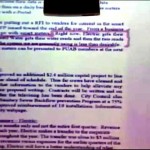There they go again. Naperville city officials inviting residents into a room and then hitting them with a two by four, at least that’s what it seems like. This time they are doing it by encouraging residents to ‘go green’ and use electric vehicles, and then just when they get a few to do so, the Naperville city council slaps them by doubling the hourly rate (from 75-cents to $1.50) to utilize a charging station.
If it wouldn’t have been true, it would have been comical listening to council members discussing how much money they can squeeze out of individuals for utilizing city charging stations. Councilman Grant Wehrli was almost giddy when mentioning ‘how about $3 hour’ but councilman Steve Chirico quickly brought Wehrli back to reality by not responding to his foolish remark.
Watch and listen as councilman Grant Wehrli wants to quickly bring it to a vote, but councilman Paul Hinterlong voices some concern about having folks take advice from the council to ‘go green’ only to find out that they are being penalized by the council for doing so.
The very short meeting ended quickly after the unanimous vote. Most likely they were in a rush to get the new doubled-rate in place while they marched down in lock-step to their favorite pub for a few brews to celebrate another council victory over trusting-residents.


I am a little surprised that you of all people are ok with some residents using the electric charging stations for free…I thought you were all about being a “watch dog” of our tax dollars…so people who have electric cars should be able to charge them up for free on the tax payers dime? Electricity isn’t free!! I don’t think so, if I am paying to fill up my tank with gas (taxes from that goes to the City), then they should pay something to fill up theirs. Sorry, but you are on the wrong side of this debate!
I drive to downtown Naperville because it did offer free charging for my EV. I appreciated the town’s efforts to support going green. I made a deliberate choice to dine and shop in such a town. No longer will I do so. I’ll avoid Naperville and spend my money in Glen Ellyn where they continue to support green initiatives with free EV charging. That’s one short-sighted city council you have there.
This is an absurd discussion in that there is no way possible these charging station can even pay for their initial cost , maintenance and insurance based on either $1.50 or $3.50
an hour. Exactly the same scenario as smart meters which will never save enough to pay for the cost of the items much less saving the customer a single dime. Stupid is as stupid continues to do. Our councilmen seem to have been electrified with this green nonsense beyond all rhyme or reason!
The City’s misplaced taxpayer “green” initiatives have led to $22 M (and needed $300,000. more per budget requests) for wireless meta data collection units forced upon citizens homes. They signed a 35 year contract (And agreed to pay a $72 million participation premium) to buy all electricity from IMEA which has a large stake in Prairie State Coal (which has faced over a billion dollar in cost over runs). Naperville Electric has over a $21 million negative cash flow and $7.5 M of electric projects that are 90% UNFUNDED, an expensive lawsuit against a nearly bankrupt company, Calico, which was paid close to $800,000.00 for a failed e-portal system. How about the taxpayer funded biconversion to fuel for the citys’s fleet vehicles that ended up with Packer Engineering closing and the project taken over by Arrgon. We have bankrupt Illinois (set to raise taxes yet again) giving Illinois a $900,000 to Naperville to build a $1.18 million for a recycling center that would be best run by private industry. Now we have Naperville using taxpayer money subsidizing the few electric vehicle drivers with charging stations, a venture that, if viablle, would be embraced by private industry. City Council are not commodities experts, nor are they expert venture capitalists. Let Naperville citizens participate in the free market and let them choose their electricity providers. The City would then purchase less electricity from IMEA and reduce the demand burden premium that is breaking them financially.